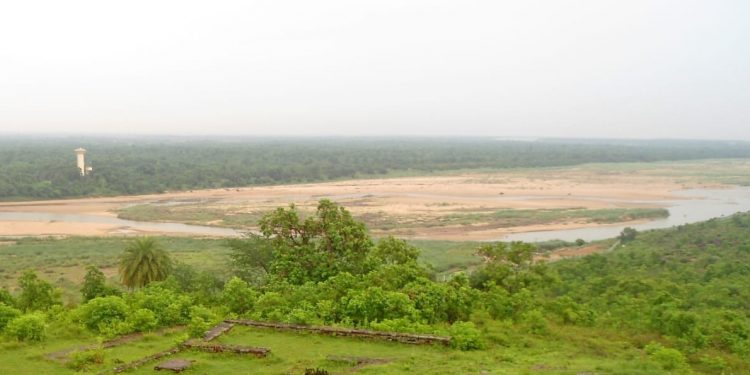Paralakhemundi: Large swathes of agricultural land in Gajapati district’s Kashinagar block are being steadily consumed by the Vamsadhara owing to a change in the course of the river. Despite the presence of three mega irrigation projects along the river intended to facilitate water supply to farmlands, farmers in the region are facing increasing losses. Hundreds of acres of cultivable land have been consumed by the river, severely affecting the livelihoods of many farming households.
Locals recall the devastating floods of 1980, during which the river changed its course, engulfing significant portions of farmlands along its banks. That trend continues to date, with the river steadily eroding its banks and swallowing farmlands. The erosion is acute across several riparian panchayats and villages. These include Palasing, Khandaba, Sara, Badigaon, Purutiguda in Khandaba panchayat, Kidigaon and Kashinagar town as well as Gouri, Bhanna, Kitingi, Bathaba, Budura, and Idudi in Budura panchayat. Every year, the river eats away at farmlands in these villages due to a change in its course.
The annual monsoon rains and recurring floods further exacerbate the erosion as the river eats away as much as 30-40 feet into the bank. As a result, hundreds of acres of land have already been lost, and crop production has significantly declined. Farmers say their land now exists only on official records, not in reality. Things have come to such a pass that many cultivators are left without any land to grow crops. Residents of riverside villages say the river’s altered course and powerful current are the primary reasons for the loss of farmlands. They are also concerned about embankments reportedly being constructed along the Andhra Pradesh side of the river, which they allege is diverting water flow towards river banks in Odisha side, worsening erosion. Many farmers of Abhilama mouza in the border region of Kashinagar block allege that parts of their farmland now lie on the Andhra side due to the river’s shifting path. The combined effect of natural erosion and disputed interventions across the border has sparked concern among farmers, threatening both their land and their livelihood.
Also Read: Swift trial initiative team to probe death of college student: Police
In 2003, farmers under the leadership of late Paralakhemundi MLA Trinath Sahu, began cultivating mangoes, cashew, and other fruit-bearing trees on their rightful land across the Andhra border. However, over the years, frequent elephant intrusions turned the area into a hotspot for wildlife movement, making it increasingly difficult for farmers to cross the river and cultivate their fields on the other side of the state border.
Locals and intellectuals in the town claim the land has gradually fallen under the unofficial control of neighbouring Andhra Pradesh due to the lack of consistent monitoring. Despite repeated appeals to the state government to relocate the affected farmers or provide alternative farmland and a permanent solution, no substantial steps have been taken so far. Residents have urged the district administration to intervene and take concrete steps to support the distressed farmers.






































